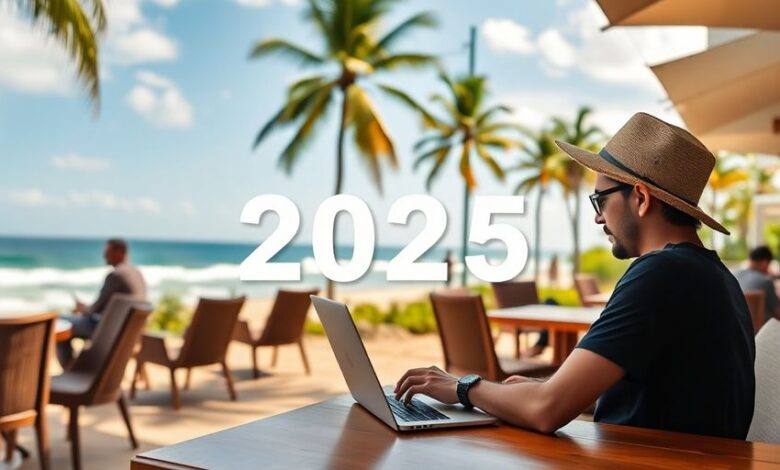
Have you ever thought about breaking free from the daily grind and exploring the world while working? The digital nomad lifestyle offers a unique blend of work and travel, allowing you to earn a living from anywhere with just a laptop and an internet connection. In this guide, we’ll walk you through the steps on how to become a digital nomad in 2025, covering everything from essential skills to finding job opportunities and navigating visa requirements. Get ready to embrace a life of adventure and freedom!
Key Takeaways
- Digital nomadism lets you work from anywhere, giving you the chance to travel and experience new cultures.
- Building in-demand digital skills is crucial for finding remote work opportunities.
- Networking online can help you connect with other professionals and find job leads.
- Understanding visa requirements is essential for living and working abroad legally.
- Creating a solid work routine helps balance productivity with travel experiences.
Understanding The Digital Nomad Lifestyle
Defining Digital Nomadism
So, what is a digital nomad? It’s more than just working from a coffee shop. It’s a lifestyle where you use technology to work remotely and travel, not being tied to a specific location. Think of it as blending work and travel into one big adventure. Digital nomads use laptops, tablets, and smartphones to connect with clients and companies, allowing them the freedom to explore new places while still earning a living. It’s about designing a life that prioritizes freedom and flexibility.
Benefits Of A Nomadic Life
The appeal of the digital nomad lifestyle is pretty strong. Who wouldn’t want to work from a beach in Bali or a cafe in Paris? The benefits go beyond just cool Instagram photos, though.
- Flexibility: You control your schedule and work environment.
- Travel: Experience new cultures and see the world.
- Personal Growth: Constantly adapting to new situations builds resilience and broadens your perspective.
- Work-life balance: Digital nomads are drawn to the idea of having control over their time, the ability to work remotely from anywhere, and the opportunity to integrate work with their personal lives.
It’s not always sunshine and rainbows, but the potential for a more fulfilling and exciting life is definitely there.
Challenges Faced By Digital Nomads
Okay, let’s be real. It’s not all perfect. Being a digital nomad comes with its own set of challenges. You’ll need to figure out things like reliable internet access, managing finances across different countries, and dealing with loneliness. Finding a stable income stream can also be tough, especially when you’re just starting out. Here are some common hurdles:
- Unstable Income: Freelance work can be unpredictable.
- Loneliness: It can be hard to build lasting relationships when you’re constantly on the move.
- Practical Issues: Visas, taxes, and healthcare can be complicated.
- Maintaining a productive work routine: You need to be on top of your work responsibilities and maintain a balanced lifestyle. By establishing a solid organizational foundation, you can enhance your productivity and make the most of your digital nomad lifestyle.
Essential Skills For Remote Work
In-Demand Digital Skills
To really make it as a digital nomad, you can’t just rely on wanderlust and a laptop. You need some serious skills that people are willing to pay for. The digital landscape is always changing, so staying ahead of the curve is super important.
- Data analysis: Companies need people who can make sense of all the information they’re collecting.
- Content creation: From blog posts to videos, there’s a huge demand for engaging content.
- Web development: If you know how to code, you’ll never be out of work. Understanding artificial intelligence fluency is also a plus.
It’s not enough to just have the skills; you need to be able to prove you have them. That means building a portfolio and constantly learning new things.
Building A Strong Portfolio
Okay, so you’ve got the skills. Now, how do you show them off? A strong portfolio is your best friend. Think of it as your digital resume, but way more engaging.
- Showcase your best work: Only include projects you’re proud of.
- Tailor it to your target audience: What kind of jobs are you looking for?
- Keep it updated: Add new projects as you complete them.
Don’t just list your skills; demonstrate them. If you’re a writer, include links to your published articles. If you’re a designer, show off your best designs. Make it easy for potential clients to see what you can do. It’s also important to build a strong online presence.
Networking In The Digital Space
Networking is key, even when you’re working remotely. It’s all about connecting with other people in your field, sharing ideas, and finding new opportunities.
- Attend online conferences and webinars.
- Join relevant social media groups.
- Reach out to people you admire.
It can feel weird to network online, but it’s worth it. You never know where your next job or collaboration might come from. Plus, it’s a great way to stay connected to the digital nomad community and avoid feeling isolated. Remember, building relationships is just as important as building your skills. You can also look into freelancing platforms to find new opportunities.
Finding Remote Job Opportunities
Job Boards For Digital Nomads
Finding remote work can feel like searching for a needle in a haystack, but thankfully, there are job boards specifically designed for digital nomads. These platforms act as a central hub, connecting companies that embrace remote work with individuals seeking location-independent opportunities. Using niche job boards increases your chances of finding a role that aligns with your nomadic lifestyle.
Here are a few popular options:
- Remote.co: This site has a wide variety of remote jobs across different industries.
- We Work Remotely: Known for its curated list of high-quality remote positions.
- FlexJobs: While it requires a subscription, FlexJobs verifies each listing to ensure its legitimacy, reducing the risk of scams. They also have part-time data entry job opportunities.
Freelancing Platforms
Freelancing platforms are another excellent avenue for securing remote work. These platforms allow you to create a profile, showcase your skills, and bid on projects that match your expertise. Building a strong profile is key to standing out from the competition.
Some of the most popular freelancing platforms include:
- Upwork: A large platform with a wide range of projects available.
- Fiverr: Ideal for offering specific services at fixed prices.
- Toptal: Focuses on connecting clients with top freelance talent in tech and design.
Creating Your Own Opportunities
Don’t limit yourself to traditional job boards and freelancing platforms. Consider creating your own opportunities by starting a business or offering your services directly to clients. The beauty of entrepreneurship is that you have complete control over your income and the type of work you do. Plus, there are endless opportunities to turn your unique skills and talents into a remote money-maker. Have a knack for photography? Sell your prints online. Love to write? Offer freelance copywriting services to businesses in need. The possibilities are endless for online businesses.
The key is to identify your skills and talents and find ways to monetize them remotely. The digital nomad lifestyle is all about freedom and flexibility, and creating your own opportunities is the ultimate expression of that freedom.
Navigating Digital Nomad Visas

Understanding Visa Requirements
Okay, so visas. They can seem like a huge headache, but they’re a necessary part of the digital nomad life. You can’t just show up anywhere and start working. Different countries have different rules, and it’s your job to know them. First, figure out what kind of visa you need. Are you just visiting as a tourist, or do you plan to work remotely while you’re there? A tourist visa usually isn’t enough if you’re earning money. You’ll likely need a special digital nomad visa or a work visa. Check the specific requirements for each country you’re considering. These can include:
- Proof of income
- Health insurance
- A clean criminal record
- Sufficient funds to support yourself
It’s always better to be over-prepared than under-prepared. Start researching visa requirements well in advance of your trip. Things can change quickly, and you don’t want to be caught off guard.
Popular Destinations With Nomad Visas
Some countries are actively trying to attract digital nomads, which is great news for us! They’ve created special visa programs that make it easier to live and work there legally. Here are a few popular options:
- Estonia: Offers a Digital Nomad Visa that allows you to live and work there for up to a year.
- Portugal: Has a D7 Visa, which is technically a passive income visa, but it’s often used by remote workers.
- Barbados: The Barbados Welcome Stamp is another option for long-term stays.
These countries often have lower costs of living, good internet infrastructure, and a thriving digital nomad community. Do your research to see which destination best fits your needs and preferences.
Applying For A Digital Nomad Visa
Applying for a visa can be a bit of a process, but it’s manageable if you take it step by step. Here’s a general outline of what to expect:
- Research: Start by thoroughly researching the visa requirements for your chosen country. Check the official government website for the most up-to-date information.
- Gather Documents: Collect all the necessary documents, such as your passport, proof of income, health insurance, and criminal record check. Make sure everything is translated into the local language if required.
- Complete the Application: Fill out the visa application form accurately and honestly. Double-check everything before submitting it.
- Pay the Fee: Pay the visa application fee. The amount varies depending on the country and the type of visa.
- Attend an Interview: Some countries require you to attend an interview at their embassy or consulate. Be prepared to answer questions about your plans and intentions.
- Wait for Approval: Once you’ve submitted your application, you’ll have to wait for it to be processed. This can take anywhere from a few weeks to several months. Be patient and don’t book any flights until your visa is approved.
It’s a good idea to start the application process well in advance of your planned departure date. Visa applications can take time, and you don’t want to be scrambling at the last minute. If you’re unsure about anything, consider consulting with an immigration lawyer or visa specialist.
Establishing A Productive Work Routine
Being a digital nomad sounds amazing, right? And it is! But it’s not all beaches and sunsets. You actually have to, you know, work. And that can be tough when your office is wherever you happen to be. So, let’s talk about how to actually get stuff done.
Setting Up Your Workspace
Okay, so you’re not in a cubicle anymore. Great! But that doesn’t mean you can just work from anywhere. You need a dedicated workspace, even if it’s a small one. Think about it: trying to answer emails while balancing your laptop on your knees at a crowded cafe? No thanks. Find a spot that’s relatively quiet and free from distractions. It could be a corner in your Airbnb, a co-working space, or even just a specific table at your favorite coffee shop. The key is consistency. Make sure you have reliable Wi-Fi, too. Nothing kills productivity faster than spotty internet.
Time Management Techniques
Time management is super important. When you’re your own boss (sort of), it’s easy to let things slide. Here are a few things that have helped me:
- Time Blocking: Schedule everything, even breaks. Seriously. Allocate specific chunks of time for specific tasks. This helps you stay focused and prevents you from getting sucked into the black hole of social media.
- The Pomodoro Technique: Work in focused bursts (like 25 minutes) with short breaks in between. It’s surprisingly effective for maintaining concentration.
- Prioritize ruthlessly: Not everything is urgent or important. Learn to identify the tasks that actually move the needle and focus on those first. Use a daily schedule to stay on track.
I found that setting realistic goals for each day is key. Don’t try to cram 10 hours of work into an 8-hour day. Be honest with yourself about what you can realistically accomplish, and then celebrate those small wins.
Balancing Work And Travel
This is the big one, right? How do you actually see the world and get your work done? It’s a constant balancing act. Here’s what I’ve learned:
- Plan your travel days carefully: Don’t try to work on travel days unless you absolutely have to. Those days are for getting from point A to point B. Factor in travel time, potential delays, and the need to decompress when you arrive.
- Embrace slow travel: Don’t try to see everything at once. Spend more time in fewer places. This gives you more time to work and actually experience the local culture.
- Set boundaries: This is huge. It’s easy to let work bleed into your personal time when you’re a digital nomad. But you need to set clear boundaries between work and leisure. Turn off notifications, put your laptop away, and actually enjoy your surroundings. Remember to prioritize self-care to avoid burnout.
Embracing Flexibility And Adaptability

Coping With Unforeseen Changes
Okay, so you’ve planned out your entire digital nomad journey, booked flights, and found the perfect co-working space in Bali. But guess what? Life happens. Flights get delayed, internet goes down, or maybe you just don’t vibe with a place as much as you thought you would. That’s where flexibility comes in. It’s not just a nice-to-have; it’s essential for survival.
Here’s how to roll with the punches:
- Have a Plan B (and C): Always have backup options for accommodation, internet, and transportation. Don’t put all your eggs in one basket.
- Embrace the Detour: Sometimes, the best experiences come from unexpected changes. Be open to altering your plans and exploring new opportunities that arise.
- Learn to Troubleshoot: Basic tech skills and problem-solving abilities are your best friends. Knowing how to fix minor issues yourself can save you time and stress.
Remember, the digital nomad life is an adventure. Not everything will go according to plan, and that’s okay. It’s how you adapt that defines your experience.
Adapting To New Cultures
One of the coolest parts of being a digital nomad is immersing yourself in different cultures. But it’s not always easy. What’s considered polite in one country might be offensive in another.
Here are some tips for cultural adaptation:
- Do Your Research: Before you arrive, learn about the local customs, traditions, and etiquette. A little preparation goes a long way.
- Be Respectful: Even if you don’t understand something, be respectful of the local culture. Avoid making assumptions or judgments.
- Learn the Language: Even a few basic phrases can make a big difference in how you connect with locals. Plus, it shows that you’re making an effort.
Maintaining A Positive Mindset
Being a digital nomad can be amazing, but it also comes with its challenges. Homesickness, loneliness, and burnout are all real possibilities. That’s why it’s so important to cultivate a positive mindset.
Here’s how to stay positive on the road:
- Practice Gratitude: Take time each day to appreciate the good things in your life, no matter how small.
- Stay Connected: Make an effort to stay in touch with friends and family back home, and build new connections with other nomads.
- Prioritize Self-Care: Make time for activities that you enjoy and that help you relax and recharge. This could be anything from reading a book to going for a hike.
| Activity | Frequency | Benefit |
|---|---|---|
| Meditation | Daily | Reduces stress, improves focus |
| Exercise | 3x/week | Boosts mood, increases energy levels |
| Socializing | Weekly | Combats loneliness, builds connections |
Building A Supportive Community
It’s easy to feel isolated when you’re constantly on the move. That’s why building a supportive community is super important for digital nomads. It’s not just about having people to hang out with; it’s about having a network you can rely on for advice, support, and maybe even a little bit of inspiration when things get tough. Let’s look at how to make that happen.
Connecting With Other Nomads
Finding your tribe is key to thriving as a digital nomad. It’s not always easy, but it’s worth the effort. Here’s how I’ve managed to connect with other nomads:
- Co-working spaces are goldmines. Seriously, they’re full of people doing the same thing as you, and they’re usually pretty open to chatting. I’ve met some of my best nomad friends in co-working spots.
- Attend local meetups. Check out sites like Meetup.com or even just search on Facebook for digital nomad groups in the area you’re in. It’s a great way to meet people who are already in the community.
- Don’t be afraid to strike up conversations. Whether you’re in a cafe, on a tour, or just waiting in line, a simple “Hey, where are you from?” can lead to a great connection. You can find digital nomad communities online.
Utilizing Social Media
Social media isn’t just for posting vacation pics; it’s a powerful tool for connecting with other nomads. I’ve found some amazing groups and individuals through platforms like Facebook, Instagram, and even LinkedIn. Here’s how to make the most of it:
- Join Facebook groups specifically for digital nomads. There are tons of them, and they’re usually filled with people asking questions, sharing tips, and organizing meetups. Search for groups related to your interests or the locations you’re visiting.
- Use relevant hashtags on Instagram. When you post about your travels, use hashtags like #digitalnomad, #remotework, or #travelgram. This will help other nomads find you and connect with you.
- Engage with other nomads’ content. Leave comments, ask questions, and share their posts. This is a great way to build relationships and get noticed.
Having a strong online presence can also help you attract opportunities and collaborations. It’s like having a virtual business card that showcases your skills and experiences.
Joining Digital Nomad Groups
Digital nomad groups can be a lifesaver when you’re feeling lost or overwhelmed. These groups provide a sense of community, a place to ask questions, and a network of people who understand what you’re going through. Here are a few types of groups to consider:
- Location-specific groups: These groups are focused on a particular city or region. They’re great for getting local tips, finding meetups, and connecting with other nomads who are in the same area.
- Skill-based groups: These groups are focused on a particular skill or industry, such as writing, design, or marketing. They’re great for getting advice, finding clients, and collaborating on projects.
- General digital nomad groups: These groups are open to anyone who’s interested in the digital nomad lifestyle. They’re great for asking general questions, sharing experiences, and connecting with other nomads from all over the world. Remember to share your travel experiences online to connect with others.
Embrace Your Journey as a Digital Nomad
So, there you have it. Becoming a digital nomad in 2025 is totally doable if you’re ready to put in the effort. It’s about finding the right job, picking up some useful skills, and being open to new experiences. Sure, it might seem a bit overwhelming at first, but take it one step at a time. Remember, it’s not just about working from a beach or a café; it’s about living life on your own terms. You’ll face challenges, but each one is a chance to grow. So, pack your bags, grab your laptop, and get ready to explore the world while you work. Your adventure awaits!
Frequently Asked Questions
What is a digital nomad?
A digital nomad is someone who works remotely while traveling. They can work from anywhere with an internet connection, like a coffee shop or a beach.
What are the benefits of being a digital nomad?
Being a digital nomad gives you the freedom to travel and explore new places while still earning money. You can set your own schedule and enjoy a better work-life balance.
What challenges do digital nomads face?
Digital nomads may struggle with finding stable internet, dealing with time zone differences, and sometimes feeling lonely while traveling.
How can I find remote job opportunities?
You can look for remote jobs on job boards, freelancing websites, or even create your own business online.
What do I need to know about digital nomad visas?
Digital nomad visas allow you to live and work in certain countries. Each country has different rules, so it’s important to check the requirements before applying.
How can I connect with other digital nomads?
You can meet other digital nomads through social media, online groups, or by attending events and meetups in the places you travel.



